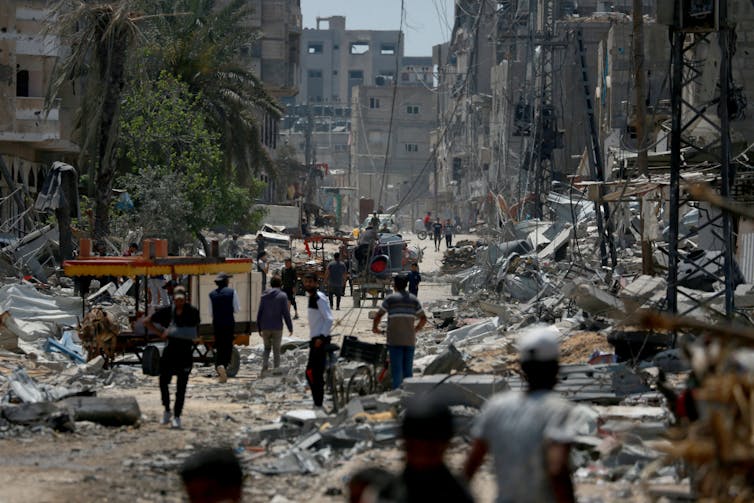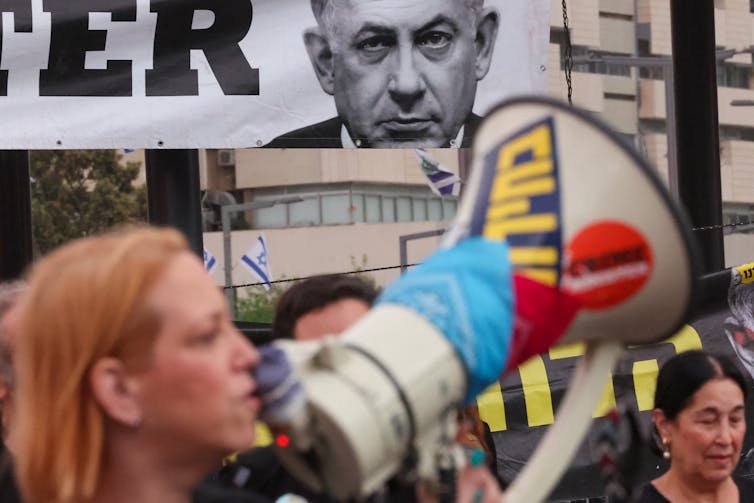
By Victor Peskin
The chief prosecutor at the International Criminal Court has requested that the court’s judges issue arrest warrants for Israeli and Hamas leaders, stemming from Hamas’ Oct. 7, 2023, attacks on Israeli civilians and Israel’s subsequent siege of Gaza.
Karim A.A. Khan, the chief prosecutor of the International Criminal Court, often known as the ICC, said in a statement that he was seeking arrest warrants for Israeli Prime Minister Benjamin Netanyahu and the Israeli defense minister, Yoav Gallant – as well as Hamas leaders Yahya Sinwar, Muhammad Deif and Ismail Haniyeh. Khan said that both the Israeli and Hamas leaders “bear criminal responsibility” for “war crimes and crimes against humanity,” which he detailed in the statement.
The ICC’s allegations against Hamas include extermination, murder, taking hostages, and committing rape and other acts of sexual violence. And the ICC allegations against the two Israeli leaders include starving Palestinians in Gaza, “intentionally directing attacks against a civilian population,” as well as persecution and “willful killing.”
The ICC, an independent tribunal based in The Hague, Netherlands, prosecutes genocide, crimes against humanity and war crimes – the latter being a legal term that includes attacking civilians and committing other wartime violations, such as blocking humanitarian aid.
Khan had announced an investigation in November 2023 to scrutinize Hamas and Israeli suspects in the aftermath of Hamas’ attack in Israel that killed 1,200 people and kidnapped hundreds more, and Israel’s subsequent war in Gaza, which has so far killed more than 34,000 Palestinians.
The ICC’s criminal investigation comes on the heels of the high-profile genocide case that South Africa brought against Israel in December 2023 in another international tribunal called the International Court of Justice.
But these investigations and courts are distinct. While the ICC can hold trials of individuals allegedly responsible for criminal violations of international humanitarian law, the International Court of Justice is a part of the United Nations that rules on civil litigation and cannot charge individuals with crimes.
As a scholar of human rights and international courts, I think it is important to emphasize that the ICC and other contemporary international criminal tribunals lack any enforcement powers of their own. That means in the Israel-Hamas situation, the ICC may never be able to arrest suspects or bring them to trial.
These international courts therefore have a mixed record of holding senior political and military leaders accountable for their crimes. It’s only if and when political leaders fall from power that there is any chance that their governments will arrest and hand them over to international courts for prosecution.

AFP via Getty Images
The challenge for international courts
Take the example of Russian President Vladimir Putin, who, since March 2023, has defied an ICC arrest warrant for allegedly committing war crimes during the Ukraine war. As long as Putin remains in power, there is practically no prospect of his arrest.
International criminal tribunals such as the ICC have a twofold problem. First, these tribunals do not have an actual international police force to carry out arrests.
Second, governments implicated in their leaders’ alleged crimes often try to obstruct international tribunals by not turning over suspects and by seeking to attack the tribunals as biased.
The enforcement problem, as my scholarship has shown, can allow the leaders of a powerful country such as Israel or an entity like Hamas to evade arrest warrants from international courts – as long as the suspects remain within their country or territory.
In this situation, Israel is not a party to the ICC, meaning it never agreed to abide by its rulings or arrest warrants and does not otherwise accept the court’s jurisdiction. The U.S. and other countries, including Qatar, where at least one of the Hamas leaders named in Khan’s arrest warrant request lives, are also not ICC members and do not face a legal obligation to make arrests.
If the ICC pre-trial chamber approves Khan’s request for arrest warrants for Netanyahu and Gallant, they could travel to meet with U.S. leaders in Washington, D.C., without fear of arrest. But they will now likely avoid travel to European Union countries, all of which are part of the ICC and would be obliged to arrest Netanyahu.
All of this may also contribute to Israel’s further international isolation and pressure over its wartime conduct.
Issuing arrest warrants for the Hamas leaders also threatens to stigmatize Hamas internationally.
The U.S., which at times has strongly opposed the ICC but has also supported the court on an ad hoc basis, as has happened in the ICC’s Ukraine war case, has warned that issuing arrest warrants for Israeli leaders could compromise a potential cease-fire agreement between Israel and Hamas.
Milosevic’s fall from power
Not all arrest warrants fail.
The trial of Serbian leader Slobodan Milosevic in the mid-2000s illustrates how international tribunals might be able to prosecute alleged war criminals once they fall from power.
In 1993, as the war in Bosnia was still being fought, the United Nations Security Council set up a special court, called the International Criminal Tribunal for the former Yugoslavia, to address crimes committed during the regional wars.
This court indicted Serbian nationalist leader Slobodan Milosevic for war crimes and crimes against humanity in 1999 during the ongoing Kosovo war. Milosevic’s alleged crimes in Kosovo included a massive ethnic-cleansing campaign waged against Kosovar Albanians, the largest ethnic group there. Milosevic later faced additional charges for alleged crimes in Bosnia and Croatia.
But Milosevic was still in power when the indictment was issued, and his government shielded him from arrest. Milosevic lost a presidential election in late September 2000 and, after widespread protests, stepped down.
The U.S. promised the new democratic government in place in Serbia substantial economic assistance to speed its postwar recovery. This helped prompt the Serbian government to arrest Milosevic and then transfer him to the the international tribunal in June 2001.

Jack Guez/AFP via Getty Images
A potential playbook for Israeli and Hamas leaders
Milosevic’s trial was launched in February 2002, but he died in prison in 2006, shortly before the end of his trial.
His trial still shows that under specific circumstances, international courts can overcome their lack of enforcement powers and bring high-level suspects to trial. International political pressure and incentives often serve an essential role in this process.
As long as any political and military leaders facing potential arrest remain in power, it is likely that no amount of political pressure or promises will persuade Israel, Qatar or other countries to cooperate with an international court and turn over any leaders, if they are indicted.
And history also shows that even if Hamas leaders are overthrown or Israeli leaders lose elections, there’s no guarantee that potential suspects will ever stand trial at the ICC.
There is broad public opposition to the ICC in Israel, with politicians across the political spectrum condemning Khan’s request for arrest warrants.
Despite the fact that Khan is also seeking to prosecute Hamas leaders, Israeli politicians have reacted to the ICC’s arrest requests with outrage.** Moreover, at least in the short term, it is highly unlikely that the U.S. will apply the type of pressure against its close ally, Israel, that it successfully applied on Serbia for Milosevic’s arrest after his fall from power.
![]()
Victor Peskin is Associate Professor of Politics and Global Studies at Arizona State University.





























Pogo says
@Congratulations
Trump, Netanyahu, Putin, Sinwar, and their like, are plainly cornered and desperate monsters who will destroy anyone, anything and everything, to survive one more minute.
The thing itself
https://www.google.com/search?q=zero+sum+game
Hurrah.
Hippy says
First of all, anything coming from the UN is and has been proven as useless….
Second, not a mention of the cause of all this BS. Nothing about stopping this at the source. Just more of the same blather…. Where is the condemnation for Iran who is funding Hamas and other terrorist groups, the source of all of this. Iran, loving the fact that Israel is doing just what it knew they would and defending itself, knowing and hoping that innocent Palestinians would be die for a photo op. Knowing that the world Media and the useless UN would do exactly what they are doing. Knowing that people all over the world would demonstrate against Israel when they know nothing about what is going on over there, and they would ignore the source of the problem.
Same old same old…. no one cares about the Palestinians, that includes the UN and the protestors and Media who continue to ignore the source of the problem and what it is going to take to stop this.